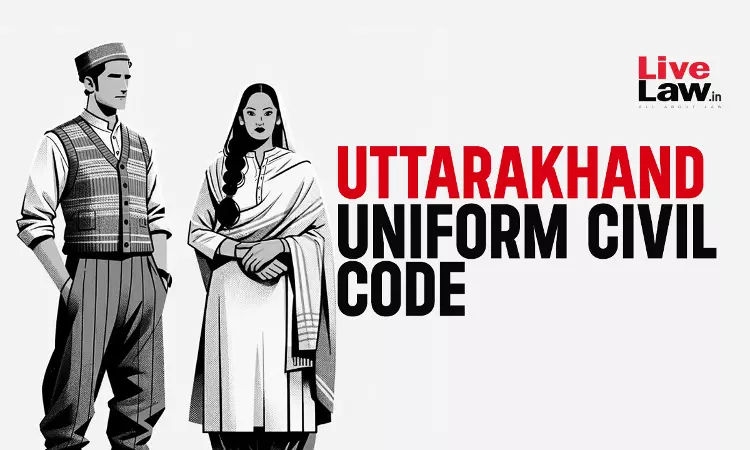A Critical View Of The Provisions On Live-In Relationship In The Uttarakhand UCC Bill
Aditendra Singh
8 Feb 2024 10:59 AM IST

On February 6th, the Uttarakhand government tabled the 'Uniform Civil Code Uttarakhand 2024 Bill' (draft UCC Bill) in the state legislative assembly. Among many provisions which have caught the eye of the public, one striking portion is the Part III of the draft UCC Bill, regulating the 'Live-in Relationship'. Till now, live-in relationship was not explicitly regulated by any law in India. Although recognition of live-in by a State is a welcome step, the draft UCC bill has an implication to raise concerns. There are three major points of controversy in Part III of the draft UCC Bill. These are firstly, registration of live-in relationships, secondly, intimation to parents of application for such registration, and thirdly, the penalties imposed for non-registration.
Section 378 of the draft UCC Bill mandatorily requires the partners in a live-in relationship to submit a 'statement' (application for registration of live-in relationship) to the Registrar. On the intimation of such statement, the registrar will register such statement unless the partners are within the prohibited degrees of relationship or the partners are minor (less than 18 years of age) or the consent of one of the partners was obtained by force, coercion, undue influence, misrepresentation or fraud concerning the identity of the other partner.
Sub-section 4(b) of Section 3 of the draft UCC Bill defines live-in relationship. It is a relationship between a man and a woman cohabiting in a shared household through a relationship in the nature of marriage. The pertinent phrase here is the 'relationship in the nature of marriage'. The term 'relationship in the nature of marriage' is not something alien to Indian Law, and the Prevention of Women from Domestic Violence Act 2005 refers to such relationships. Apex Court in D. Velusamy v. D. Patchaiammal (2010) 10 SCC 469 defines the term relationship in the nature of marriage as one where a couple hold themselves out to the world as husband and wives, cohabit in a shared household, pool their finances and other resources, etc. They must otherwise also be qualified to marry each other. Hence, the draft UCC Bill does not affect all live-in relationship as such, but only those which qualify criteria of the 'relationships in the nature of marriage'.
Registration of live-in relationship solely cannot tamper with the constitutional foundations of this law. Marriages are anyways mandatorily registered in many states, and even draft UCC bill makes a provision for the same. Draft UCC bill, by seeking registration of live-in relationship, only recognizes them for the bona fide purpose of conferring maintenance and other similar benefits on the partners in such live-in relationship.
It is the consequences of such registration which have more bearing on the draft UCC bill, and which might require some consideration. Section 385(1) states that, after receiving the statement for registration, the Registrar shall intimate the parents of the partners in such live-in relationship, if the partners are less than 21 years of age. The Supreme Court in Shafin Jahan v Asokan K.M. and Ors. 2018, has held that the choice of a partner lies within the exclusive domain of each individual's core zone of privacy, which is inviolable. While it is very much understandable for the State to intimate the parents of partners who are less than 18 years of age, the current law covers those between the ages of 18 years to 20 years. There is no gainsaying the fact that intimation to parents will injure the right to choice of an adult. Hence, the draft might need a revision, whereby in section 385, the age of the partner can be lowered to less than 18 years.
In making a strong case for mandating the registration of live-in relationships, the draft UCC bill also makes non-registration of such live-in relationships a punishable offence. Section 387 states that if partners who are staying in live-in relationships for more than 1 month do not apply for its registration, then they are liable for imprisonment for a term extending 3 months, and fine not more than Rs. 10,000. It is indeed a mistaken approach to criminalise merely the act of non-registration of live-in relationships. An unlawful act need not be a criminal act. An act shall only be criminalised if it affects the society at large, begets deterrence to its commission, and done with malafide intention. It would have been better to make the effect of non-registration a civil wrong, with the imposition of a fine.
While the draft UCC Bill aims to recognize live-in relationships, it has the tendency to upset the very peculiarity of live-in relationship. Live-in relationships are characterized by flexibility and privacy, which will get lost by its registration. Further, live-in is a taboo subject in the larger Indian society, and registration will only deter the unmarried partners from cohabiting, thus violating their fundamental rights. Furthermore, the ingress given to police by non-registration of live-in is likely to cause its misuse. As already stated, the definition of live-in relationship is a very peculiar one, and thus the training of law enforcement agencies about such nuanced definition is required, lest it would invite misuse of the law. Recognition, and not registration, of live-in relationship, would be a better alternative.
The author is an Advocate at Allahabad High Court. Views are personal.


